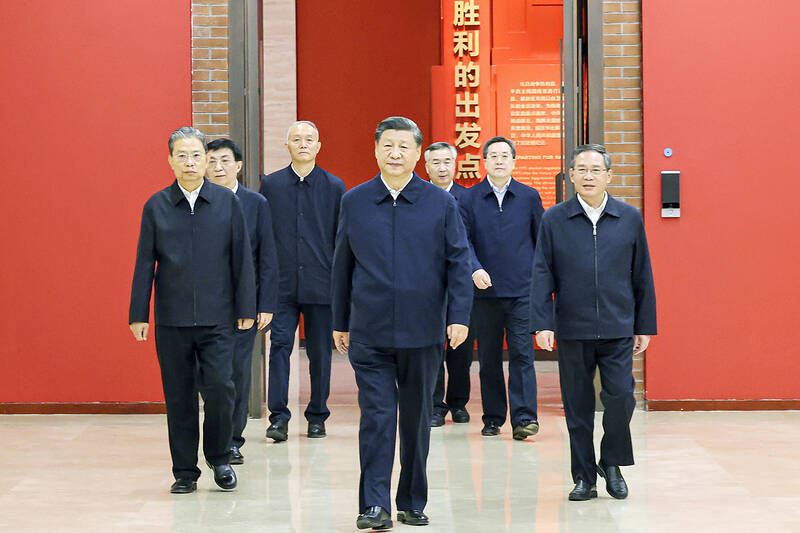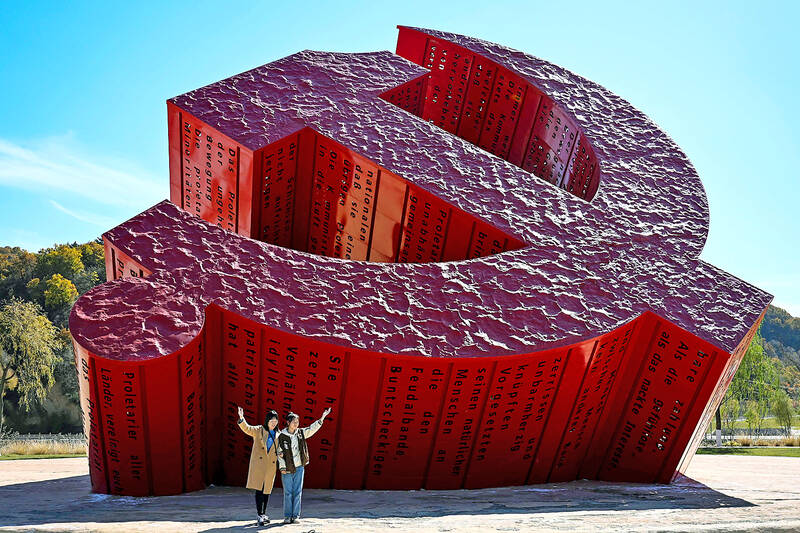Dressed in matching navy windbreakers and flanking Chinese President Xi Jinping (習近平), China’s freshly appointed top leadership this week made their first group outing to the Chinese Communist Party’s “holy land.”
Xi’s choice to visit Yanan — a site inextricably linked with Mao Zedong (毛澤東) and communist China’s founding — was an important, deliberate indication of the themes of his next five years at the helm, analysts said.
Xi has centralized and personalized power more than any Chinese leader since Mao, culminating in his being anointed with a historic third term following a Chinese Communist Party (CCP) congress. The new CCP Politburo Standing Committee he shepherded around the popular “red tourism” destination on Thursday consists solely of his loyal allies.

Photo: AP
“The signal with the visit to Yanan is one of celebrating a parallel [with Mao] and brooking no opposition,” said Manoj Kewalramani, a China studies fellow at the Takshashila Institution in Bengaluru, India.
A 16-minute news segment about the visit on China Central Television showed several portraits of Mao, and a report by Xinhua news agency mentioned the former leader’s name 14 times.
The itinerary included visits to Mao’s former residence, as well as a hall where a pivotal CCP meeting in 1945 confirmed him as party chairman, apparently showcasing Xi’s deep interest in party history and its influence on his rhetoric and policies.

Photo: AFP
However, it also harked back to an era when the CCP relied on mass “struggle” to win a bloody civil war, which observers believe has parallels with how Beijing views the current geopolitical climate.
“Among the signals Xi appears to be sending ... is prepare for difficult times ahead, and prepare for struggle,” said Bill Bishop, a veteran China watcher who runs the Washington-based Sinocism newsletter.
Xi in 2012 took the then-freshly inaugurated standing committee to an exhibition about national rejuvenation in Beijing, and in 2017 led top officials the site of the first CCP congress in Shanghai.
“The first travels after each party congress seems to be about ‘remember the original mission,’” Sung Wen-ti (宋文堤), a lecturer on Taiwan-China-US relations at the Australian National University, wrote on Twitter.
State media reported that Xi on Thursday vowed that his new standing committee would “inherit and carry forward the fine revolutionary traditions formed by the party during the Yanan period.”
Yanan is revered in CCP lore as the cradle of the movement. Nestled in the remote, arid mountains of northwestern China, it was where party members hunkered down after the Long March, a gruelling year-long expedition by foot across the country to escape encirclement by Chinese Nationalist Party (KMT) troops during the Chinese Civil War. Tens of thousands died en route, and by the time the survivors arrived in Yanan, they were a severely weakened force.
Mao and his allies, including Xi’s father, lived alongside local peasants in caves as they planned military campaigns.
The CCP’s eventual victory saw the Yanan period codified as a shining example of the party’s ability to overcome adversity.
Yanan is also firmly linked to Mao and his consolidation of power.
More than 10,000 people, including intellectuals and artists, were killed during the Yanan Rectification — a mass campaign of indoctrination and purges that established Mao as the undisputed leader.
However, Xi on Thursday said that “through the Yanan Rectification movement, the whole party united under the banner of Mao Zedong and achieved unprecedented unity.”
“A firm and correct political orientation is the essence of the Yanan spirit,” he said
One of the hallmarks of Xi’s tenure has been a focus on intra-party discipline, most obviously through a long-running anti-corruption campaign.
Critics say that drive is a thinly veiled political tool that has eliminated many of his rivals.
Xi tends to think of himself as an “heir of the revolution,” Huron University College sinologist Alfred Chan (陳仲禮) said.
In speeches, Xi has sought to draw a direct line between the past and present, using history as a source of legitimacy for both the party and himself, Chan said.
On Thursday, for example, he referred to his personal connections to Yanan.
During the height of the Cultural Revolution, 15-year-old Xi was sent to the village of Liangjiahe, where he also slept in caves and was shocked at the harshness of manual labor.
He often cites this period as a formative life experience that gave him grit and determination, as well as an insight into the lives of ordinary working class Chinese.
It is also a way in which Xi attempts to mould his public persona and life story in the vein of Mao, analysts say.
“Xi wants to go back to the orthodoxy of communism in China like Mao,” said Alfred Wu (吳木鑾), a Chinese politics expert at the National University of Singapore.

Packed crowds in India celebrating their cricket team’s victory ended in a deadly stampede on Wednesday, with 11 mainly young fans crushed to death, the local state’s chief minister said. Joyous cricket fans had come out to celebrate and welcome home their heroes, Royal Challengers Bengaluru, after they beat Punjab Kings in a roller-coaster Indian Premier League (IPL) cricket final on Tuesday night. However, the euphoria of the vast crowds in the southern tech city of Bengaluru ended in disaster, with Indian Prime Minister Narendra calling it “absolutely heartrending.” Karnataka Chief Minister Siddaramaiah said most of the deceased are young, with 11 dead

By 2027, Denmark would relocate its foreign convicts to a prison in Kosovo under a 200-million-euro (US$228.6 million) agreement that has raised concerns among non-governmental organizations (NGOs) and residents, but which could serve as a model for the rest of the EU. The agreement, reached in 2022 and ratified by Kosovar lawmakers last year, provides for the reception of up to 300 foreign prisoners sentenced in Denmark. They must not have been convicted of terrorism or war crimes, or have a mental condition or terminal disease. Once their sentence is completed in Kosovan, they would be deported to their home country. In

Brazil, the world’s largest Roman Catholic country, saw its Catholic population decline further in 2022, while evangelical Christians and those with no religion continued to rise, census data released on Friday by the Brazilian Institute of Geography and Statistics (IBGE) showed. The census indicated that Brazil had 100.2 million Roman Catholics in 2022, accounting for 56.7 percent of the population, down from 65.1 percent or 105.4 million recorded in the 2010 census. Meanwhile, the share of evangelical Christians rose to 26.9 percent last year, up from 21.6 percent in 2010, adding 12 million followers to reach 47.4 million — the highest figure

LOST CONTACT: The mission carried payloads from Japan, the US and Taiwan’s National Central University, including a deep space radiation probe, ispace said Japanese company ispace said its uncrewed moon lander likely crashed onto the moon’s surface during its lunar touchdown attempt yesterday, marking another failure two years after its unsuccessful inaugural mission. Tokyo-based ispace had hoped to join US firms Intuitive Machines and Firefly Aerospace as companies that have accomplished commercial landings amid a global race for the moon, which includes state-run missions from China and India. A successful mission would have made ispace the first company outside the US to achieve a moon landing. Resilience, ispace’s second lunar lander, could not decelerate fast enough as it approached the moon, and the company has